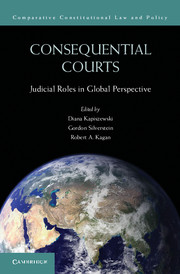Book contents
- Frontmatter
- Contents
- Contributors
- Introduction
- PART I EXPANDING JUDICIAL ROLES IN NEW OR RESTORED DEMOCRACIES
- 1 The Politics of Courts in Democratization
- 2 Fragmentation? Defection? Legitimacy?
- 3 Constitutional Authority and Judicial Pragmatism
- 4 Distributing Political Power
- 5 The Transformation of the Mexican Supreme Court into an Arena for Political Contestation
- Part II EXPANDING JUDICIAL ROLES IN ESTABLISHED DEMOCRACIES
- PART III FOUR “PROVOCATIONS”
- Conclusion Of Judicial Ships and Winds of Change
- Index
- References
2 - Fragmentation? Defection? Legitimacy?
Explaining Judicial Roles in Post-Communist “Colored Revolutions”
Published online by Cambridge University Press: 05 April 2013
- Frontmatter
- Contents
- Contributors
- Introduction
- PART I EXPANDING JUDICIAL ROLES IN NEW OR RESTORED DEMOCRACIES
- 1 The Politics of Courts in Democratization
- 2 Fragmentation? Defection? Legitimacy?
- 3 Constitutional Authority and Judicial Pragmatism
- 4 Distributing Political Power
- 5 The Transformation of the Mexican Supreme Court into an Arena for Political Contestation
- Part II EXPANDING JUDICIAL ROLES IN ESTABLISHED DEMOCRACIES
- PART III FOUR “PROVOCATIONS”
- Conclusion Of Judicial Ships and Winds of Change
- Index
- References
Summary
One of the key insights of research on comparative judicial politics is that judicial power moves in mysterious ways: strong courts sometimes fail to command the obedience of other political actors, and weak courts sometimes compel rulers to obey adverse rulings. Neither the trajectory nor destination of judicial power is set in stone: the de facto power of courts moves in a nonlinear fashion and shrinks as often as it expands (Chavez 2004; Vanberg 2005; Moustafa 2007; Trochev 2008; Staton 2010). As the editors remind us in the Introduction to this book, judges’ internal motivations as well as the external influences on courts interact in complex ways, leading courts to play very different roles. Drawing on judicial experiences in resolving highly contested electoral disputes in three post-Soviet countries (unique occurrences in this region), this chapter provides empirical evidence of this variation.
Georgia, Ukraine, and Kyrgyzstan are the only post-Soviet states that underwent “colored revolutions” – peaceful mass protests against fraudulent national elections that toppled incumbent presidents – between 2003 and 2005 (Wheatley 2005; Wilson 2005; Radnitz 2010). One factor that appears to be of central importance to these conflicts, but that so far has received little attention, is the differing role assumed by the courts in supporting these revolutions. Unexpectedly, the political opposition – in addition to street protests – actively used litigation to expose electoral fraud. Unexpectedly, Supreme Courts – which are staffed with Soviet-era judges – canceled rigged elections, thus opening the way for a peaceful change of government. Also unexpectedly, the incoming governments did not embrace judicial independence, instead pressuring and eventually emasculating judiciaries, a move voters did not seem to resist.
- Type
- Chapter
- Information
- Consequential CourtsJudicial Roles in Global Perspective, pp. 67 - 92Publisher: Cambridge University PressPrint publication year: 2013
References
- 10
- Cited by



